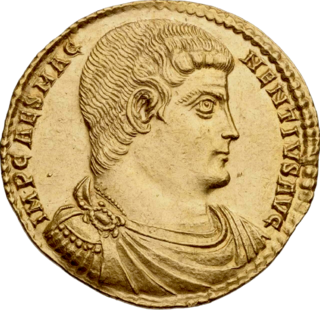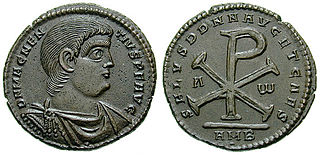Year 205 (CCV) was a common year starting on Tuesday of the Julian calendar. At the time, it was known as the Year of the Consulship of Aurelius and Geta. The denomination 205 for this year has been used since the early medieval period, when the Anno Domini calendar era became the prevalent method in Europe for naming years.

Gratian was emperor of the Western Roman Empire from 367 to 383. The eldest son of Valentinian I, Gratian was raised to the rank of Augustus as a child and inherited the West after his father's death in 375. He nominally shared the government with his infant half-brother Valentinian II, who was also acclaimed emperor in Pannonia on Valentinian's death. The East was ruled by his uncle Valens, who was later succeeded by Theodosius I.

Gaius Vibius Trebonianus Gallus was Roman emperor from June 251 to August 253, in a joint rule with his son Volusianus.

Hostilian was briefly Roman emperor in 251. Hostilian was born to Decius and Herennia Etruscilla at an unknown date and elevated to caesar in 250 by Decius. After Decius and Herennius Etruscus, Hostilian's brother, were killed at the Battle of Abritus, an ambush by the Goths, Trebonianus Gallus was proclaimed emperor by the legions. Almost immediately, he elevated Hostilian to co-emperor and his own son, Volusianus, to caesar. Hostilian died soon after, either due to plague or being murdered by Trebonianus Gallus.

Magnus Magnentius was a Roman general and usurper against Constantius II. Of Germanic descent, Magnentius served with distinction in Gaul under the emperor Constans. On 18 January 350 Magnentius was acclaimed Augustus. Quickly killing the unpopular Constans, Magnentius gained control over most of the Western Empire. The Eastern emperor Constantius II, the brother of Constans, refused to acknowledge Magnentius' legitimacy and led a successful campaign against Magnentius. Ultimately, Magnentius' forces were scattered after the Battle of Mons Seleucus, and he died by suicide on 10 August 353.

Caesar is a title of imperial character. It derives from the cognomen of the Roman dictator Julius Caesar. The change from being a surname to a title used by the Roman emperors can be traced to AD 68, following the fall of the Julio-Claudian dynasty. When used on its own, the title denoted heirs apparent, who would later adopt the title Augustus on accession. The title remained an essential part of the style of the emperors, and became the word for "emperor" in some languages, such as German and Russian.
Gratianus "Funarius" was an Illyrian soldier of the Roman Empire who flourished in the 4th century. He was the father of Roman emperors, Valentinian I and Valens, founders of the Valentinianic dynasty.

The Theodosian dynasty was a Roman imperial family that produced five Roman emperors during Late Antiquity, reigning over the Roman Empire from 379 to 457. The dynasty's patriarch was Theodosius the Elder, whose son Theodosius the Great was made Roman emperor in 379. Theodosius's two sons both became emperors, while his daughter married Constantius III, producing a daughter that became an empress and a son also became emperor. The dynasty of Theodosius married into, and reigned concurrently with, the ruling Valentinianic dynasty, and was succeeded by the Leonid dynasty with the accession of Leo the Great.

The Battle of Mons Seleucus was fought in 353 between the armies of the Roman emperor Constantius II and the usurper Magnentius. Constantius' forces were victorious. Support for Magnentius had been eroding since his defeat at the Battle of Mursa Major two years prior; after Mons Seleucus his cause collapsed and he killed himself.
Domnica was a Roman empress as the wife of the emperor Valens, who ruled the East from 364 to 378. After the death of her husband at the Battle of Adrianople, she ruled as de facto regent and defended Constantinople against the attacking Goths until his successor Theodosius I arrived.
Bassianus was a Roman senator, whom the Emperor Constantine I arranged to marry his half-sister, Anastasia. In 314 Constantine hoped to elevate Bassianus to the imperial rank of caesar, but Constantine's co-augustus in the East Licinius successfully opposed the move. According to the Anonymus Valesianus, a Latin chronicle composed during late antiquity, Bassianus was accused of plotting against the throne and was executed by Constantine.

Magnia Urbica was the wife of the Roman Emperor Carinus. She was granted the honorifics Augusta and Mater castrorum, senatus ac patriae. She and Carinus may have been the parents of Nigrinian.

Marcia Otacilia Severa was the Roman empress and wife of Emperor Philip the Arab, who reigned over the Roman Empire from 244 to 249. She was the mother of Emperor Philip II.

Ulpia Severina was Roman empress as the wife of Roman emperor Aurelian from c. 270 to 275. Severina is unmentioned in surviving literary sources and known only from coinage and inscriptions, and as a result, very little is known about her. Her nomen Ulpia suggests that she may have been related either to Emperor Trajan or the usurper Laelianus, as they share the same nomen, and perhaps from Dacia, where the name was common. It is not known when she married Aurelian, but it might have been before he became emperor. She was probably proclaimed Augusta in the autumn of 274.
Afinia Gemina Baebiana was the wife of Roman emperor Trebonianus Gallus, who ruled briefly in 251–253.

Constantia (362–383) was the first empress consort of Gratian of the Western Roman Empire. According to Ammianus Marcellinus, her mother was Faustina and her father was Constantius II, who died before Constantia was born.

Licinius II, also called Licinius Junior or Licinius Caesar, was the son of the Roman emperor Licinius I. He held the imperial rank of caesar between March 317 and September 324, while his father was augustus, and he was twice Roman consul. After losing a civil war, his father lost power and both he and Licinius Junior were eventually put to death.

Noviodunum ad Istrum was a Roman city that developed around the legionary fortress and naval port near the present town of Isaccea. It was in the Roman province of Moesia and was the headquarters of the Roman Danube fleet located on the lower Danube and, from the 4th century AD, the headquarters of the Legio I Iovia (Scythica).

Valentinianus Galates was the only son of the Roman emperor Valens, who ruled the Roman Empire from 364 to 378. Born into the ruling Valentinianic dynasty, Galates became Roman consul in 369, but he died in early childhood, and the empire passed to the descendants of Valentinian I, Galates's uncle, whom he was named after.














